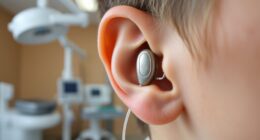Imagine a quiet room suddenly filled with the loud sound of a live concert. This demonstrates the potential harm AirPods can cause to our hearing if used carelessly.
But how exactly do these sleek devices contribute to hearing loss? Let's explore the science behind it and discover practical ways to safeguard our precious sense of hearing.
Key Takeaways
- AirPods emit sounds exceeding safe levels, risking hearing damage.
- Prolonged high-volume usage can lead to tinnitus and ear impairment.
- Monitoring decibel levels and taking breaks are crucial for hearing health.
- Consider over-ear headphones for better sound isolation and reduced risk of damage.
Understanding Decibel Levels and AirPods
When using AirPods, it's essential to understand the significance of decibel levels in order to prevent potential hearing damage. AirPods can emit sounds exceeding 100 dB, which, with prolonged exposure, can lead to hearing impairment.
Monitoring sound levels is crucial as high background noise, common in daily environments, can mask the perceived loudness when using AirPods. To ensure safe listening, it's recommended to keep the volume in the 60s or 70s dB range.
Improper use, like combining AirPods with noisy settings such as airplanes, can result in unsafe noise levels. Utilizing the noise-canceling features of AirPods can help mitigate external sounds, reducing the need to increase volume to dangerous levels.
Checking the decibel levels directly through iPhone settings provides a convenient way to regulate and prevent excessive exposure to loud noises, safeguarding our hearing health in the long term.
Effects of Prolonged AirPods Usage

Prolonged usage of AirPods at high volumes poses a significant risk of damaging inner ear hair cells, leading to potential hearing loss. Continuous exposure to loud music through AirPods can have detrimental effects on our inner ear structures, potentially causing temporary or permanent ear damage.
Listening to music above 85 decibels for extended periods with AirPods can harm the delicate inner ear hair cells responsible for transmitting sound signals to the brain. Even lower sound levels like 74 dB can contribute to ear impairment if listened to for prolonged durations using AirPods.
It's crucial to be mindful of our listening habits and take precautions to protect our ears. Implementing safe listening practices such as taking regular breaks, limiting the volume levels, and using noise-cancelling features can help prevent ear damage from prolonged AirPods usage.
Risk of Tinnitus From Airpods
Excessive exposure to high volumes through the use of AirPods can result in the development of tinnitus, a condition characterized by persistent ringing or buzzing sounds in the ears. Monitoring your listening habits and volume levels with AirPods is crucial to prevent discomfort and potential tinnitus. It's essential to be mindful of high-volume settings on AirPods to reduce the risk of tinnitus and other ear-related issues. Tracking your AirPods usage and taking regular breaks can help mitigate the chances of experiencing tinnitus or other ear problems.
| Risk Factors for Tinnitus from AirPods | Recommendations |
|---|---|
| Prolonged high volume exposure | Monitor volume levels and take breaks to prevent tinnitus. |
| Loud noise exposure from AirPods | Be mindful of surrounding noise levels to protect your ears. |
| Unmonitored listening habits | Track usage patterns to identify risky behaviors and adjust accordingly. |
| Discomfort or pain in the ears | Seek professional help if you experience any discomfort or pain. |
| Impact on overall ear health | Prioritize ear health by practicing safe listening habits and maintaining regular breaks. |
Tips to Safeguard Your Hearing Health

To safeguard your hearing health effectively, it's crucial to implement practical strategies that promote safe listening habits and minimize the risk of potential hearing damage. When using earbuds like AirPods, limiting the volume to 60% or lower can significantly reduce the risk of hearing damage caused by high decibel levels.
Taking breaks from prolonged use of AirPods allows your ears to rest and recover from exposure to loud sounds, lowering the chances of noise-induced hearing issues. Utilizing noise-canceling features wisely can help you enjoy your music without the need for excessively high volumes that can harm your ears.
Monitoring your daily usage of AirPods is essential to prevent overexposure to loud noises and protect your ear canals from potential risks. Consider opting for over-ear headphones, as they provide better sound isolation and reduce direct exposure to your eardrums compared to in-ear earbuds, promoting healthy listening habits.
Comparing Earbud and Over-Ear Headphone Safety
When considering the safety aspects of earbuds versus over-ear headphones, it becomes apparent that the design and features of each play a crucial role in protecting our hearing health.
Over-ear headphones provide better sound isolation, reducing direct exposure to the eardrums, which lowers the risk of hearing damage. The larger design of over-ear headphones also contributes to minimizing the potential for hearing damage compared to in-ear earbuds. Additionally, over-ear headphones equipped with noise-canceling capabilities can further enhance safety by reducing external noise, allowing for lower volume levels during music listening sessions.
On the other hand, in-ear earbuds may lead to higher volume usage due to less sound isolation compared to over-ear headphones. This increased volume exposure poses a greater risk of hearing loss if not used responsibly. Therefore, when it comes to safeguarding our ears while enjoying music, choosing over-ear headphones with sound isolation features and practicing responsible listening habits can significantly reduce the risk of hearing damage associated with loud music exposure.
Frequently Asked Questions
Do Airpods Contribute to Hearing Loss?
Yes, AirPods can contribute to hearing loss. Prolonged exposure to high volumes exceeding 85 decibels can harm inner ear hair cells, leading to damage. Even lower sound levels, like 74 dB, can be detrimental with extended use.
Active noise cancellation features may boost volume levels, further increasing the risk of hearing damage. To safeguard our ears, it's vital to use AirPods at moderate volumes, take breaks, and limit lengthy listening periods.
Can Airpods Be Used as Ear Protection?
Sure thing!
AirPods aren't suitable for ear protection against high decibel levels. They lack noise isolation, risking hearing damage. High volumes can contribute to temporary or permanent ear damage.
It's crucial to use proper ear protection in loud environments rather than relying on AirPods.
What Happens to Your Ears if You Wear Airpods Too Much?
If we wear AirPods excessively, our ears can suffer from temporary or permanent hearing loss due to damage to the delicate inner ear hair cells. Prolonged exposure to sound levels above 85 decibels, such as those emitted by AirPods, is particularly harmful. Even lower volumes, like 74 dB, can cause harm with extended use.
To safeguard our hearing, it's crucial to regulate volume, take breaks, and limit AirPods usage.
Do Airpods Have Loss Protection?
Yes, AirPods lack built-in loss protection features. Users must actively manage volume levels and usage duration to prevent potential hearing damage.
Excessive volume and prolonged exposure via AirPods can lead to hearing loss. Monitoring decibel levels and taking breaks are crucial for ear health.
Responsible usage practices and awareness are vital in safeguarding against potential hearing issues when using AirPods.
Conclusion
As we navigate the world of technology, let's remember to cherish our most precious gift – our hearing.
Just as we protect our AirPods, let's also protect our ears with mindful listening habits.
Like the delicate balance of sound waves in harmony, let's strive for a balance in our listening practices to ensure a symphony of healthy hearing for years to come.










